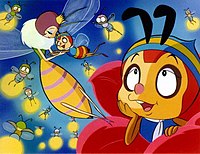The Adventures of Hutch the Honeybee
| The Adventures of Hutch the Honeybee | |
 Screenshot from the television series | |
| 昆虫物語 みなしごハッチ (Konchū Monogatari Minashigo Hatchi) | |
|---|---|
| Genre | Adventure |
| Anime television series | |
| Directed by | Ippei Kuri |
| Produced by | Tatsuo Yoshida |
| Written by | Jinzo Toriumi |
| Music by | Nobuyoshi Nishibe |
| Studio | Tatsunoko Productions |
| Original network | Fuji Television |
| Original run | April 7, 1970 – September 8, 1971 |
| Episodes | 91[1] |
The Adventures of Hutch the Honeybee (昆虫物語 みなしごハッチ, Konchū Monogatari: Minashigo Hatchi, lit. A Bug's Tale: Hutch the Orphan) is an anime series produced by Tatsunoko Productions. The series features the adventures of a young bee named Hutch : the son of a Queen bee, Hutch is separated from his mother when his native beehive is destroyed by an attack of wasps. The series follows Hutch as he searches for his missing mother, in the midst of a frequently hostile nature.[2][3]
After being broadcast in several European countries, the show was translated into English as Honeybee Hutch, and re-edited in the 1990s, by Saban Entertainment. A sequel, The New Adventures of Hutch the Honeybee, and numbering 26 episodes, was produced in 1974. The original series was remade in 1989 under the same Japanese title, Minashigo Hutch.
The original show (1971) is notable for its frequently sad and cruel scripts.[4] In many episodes, Hutch would befriend another insect, only to see his new friend die a violent and painful death. In one, he befriended a female honey bee who lost her brothers and sisters to a hornet army. The 1989 remake, however, featured completely new episodes and a much more light-hearted story. On 31 July, a 2010 movie which was a remake of show was released in Japan titled Hutch the Honeybee.
Voice Cast
- Chieko Honda as Teru
- Haruko Kitahama as Mama
- Junji Chiba as Piccolo
- Masako Nozawa as Bunkichi
- Minoru Midorikawa as Water Scorpion
- Takeshi Watabe as Kamakiri
- Toshiko Sawada as Narrator
- Yoshiko Matsuo as Flower
- Yoshiko Sakakibara as Queen
- Yoshiko Yamamoto as Aya
- Youko Kuri as Hutch
- Yuuko Maruyama as Apachi[1]
English dub cast
- Joshua Seth as Hutch
- Mari Devon as the Narrator
- Edie Mirman as Honey Queen Bee
- Heidi Lenhart as Haley
- Frank Catalano as Hutch's Evil Twin Brother
- Dorothy Elias-Fahn as various voices
- R. Martin Klein as Dan Dan
- Melodee Spevack as Hutch's Mother
Other foreign versions
The original series was broadcast in France, by TF1, and Quebec (Canada) starting in 1979, under the titles Le Petit Prince Orphelin (The little Orphan Prince) and Hutchy le Petit Prince Orphelin. The re-edited Saban version was broadcast in 1997, under the title Micky l'abeille (Micky the bee), with a new French dubbing.[4]
In Italy, the show was broadcast by various local TV channels in the late 1970s as Le avventure dell'Ape Magà (The Adventures of Magà the Bee), a title similar to the more popular Maya the Bee, with a dub derived from the original Japanese version. In the Italian dubbing, the male character of Hutch was turned into a female bee like Maya, which created some awkward moments in the translations, such as in the episode which depicts Hutch falling in love with a female butterfly. The Italian dialogue sometimes left the character's gender unclear, generating some confusion. In 1997 a new dub, derived from the American version, aired on Italia 1 under the title Un alveare d'avventure per l'Ape Magà (A Hive of Adventures for Magà the Bee). In the second dub the gender of the main character is male, despite the name still being Magà.
The show was also broadcast in Spain by the television network Telecinco.
In Latin America, the show was broadcast as Josemiel in the 1980s, for Mexico, the original edition was sent in 1984 to be transmitted by Televisa and Canal 6, got a lot of appreciation by their fans due to the dramatic script and the not-translated Japanese intro and ending. Some years later, the remake named Las Aventuras de Hutch were transmitted also by Televisa, but as being adapted from the American version of the animation it got less popularity than the original series. In Brazil, it was broadcast by Rede Globo.
References
- ^ a b みなしごハッチ. Tatsunoko Production (in Japanese). Retrieved 2008-07-20.
- ^ "みなしごハッチ ダイジェスト". Web.archive.org. 2008-10-09. Archived from the original on October 9, 2008. Retrieved 2016-01-20.
{{cite web}}: Unknown parameter|deadurl=ignored (|url-status=suggested) (help) - ^ "Tatsunoko Pro". Tatsunoko Productions. Retrieved 2008-07-20.
- ^ a b Kahlone (2008-11-04). "Le Petit Prince Orphelin / Micky l'abeille" (in French). Planete Jeunesse. Retrieved 1 January 2009.
External links
- The Adventures of Hutch the Honeybee (anime) at Anime News Network's encyclopedia
- The Adventures of Hutch the Honeybee at IMDb
- Template:Bcdb title
